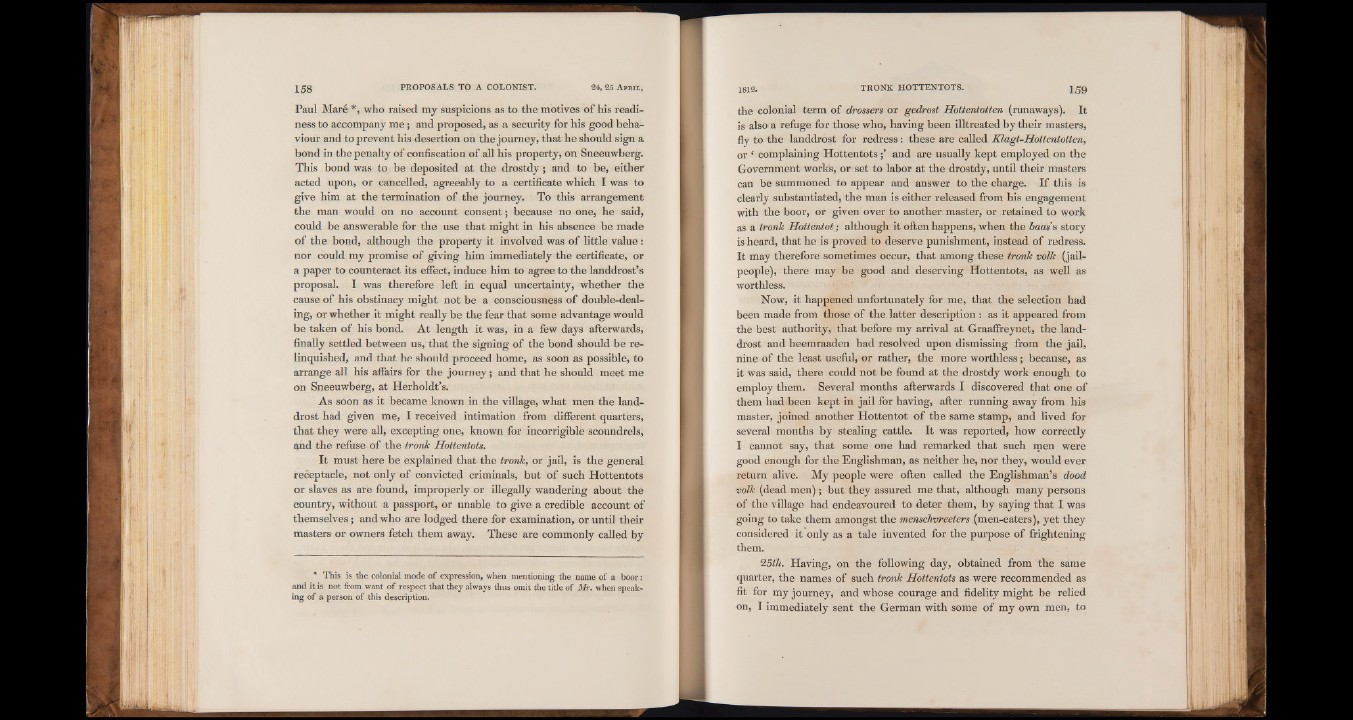
Paul Mare *, who raised my suspicions as to the motives of his readiness
to accompany m e; and proposed, as a security for his good behaviour
and to prevent his desertion on the journey, that he should sign a
bond in the penalty of confiscation of all his property, on Sneeuwberg.
This bond was to be deposited at the drostdy; and to be, either
acted upon, or cancelled, agreeably to a certificate which I was to
give him at the termination of the journey. To this arrangement
the man would on no account consent; because no one, he said,
could be answerable for the use that might in his absence be made
of the bond, although the property it involved was of little value :
nor could my promise of giving him immediately the certificate, or
a paper to counteract its effect, induce him to agree to the landdrost’s
proposal. I was therefore left in equal uncertainty, whether the
cause of his obstinacy might not be a consciousness of double-dealing,
or whether it might really be the fear that some advantage would
be taken of his bond. At length it was, in a few days afterwards,
finally settled between us, that the signing of the bond should be relinquished,
and that be should proceed home, as soon as possible, to
arrange all his affairs for the journey; and that he should meet me
on Sneeuwberg, at Herholdt’s.
As soon as it became known in the village, what men the land-
drost had given me, I received intimation from different quarters,
that they were all, excepting one, known for incorrigible scoundrels,
and the refuse of the tronk Hottentots.
It must here be explained that the tronk, or jail, is the general
receptacle, not only of convicted criminals, but of such Hottentots
or slaves as are found, improperly or illegally wandering about the
country, without a passport, or unable to give a credible account of
themselves; and who are lodged there for examination, or until their
masters or owners fetch them away. These are commonly called by
* This is the colonial mode of expression, when mentioning the name of a boor:
and it is not from want of respect that they always thus omit the title of Mr. when speaking
of a person of this description.
the colonial term of drossers or gedrost Hottentotten (runaways). It
is also a refuge for those who, having been illtreated by their masters,
fly to the landdrost for redress: these are called Klagt-Hottentotten,
or ‘ complaining H otten totsan d are usually kept employed on the
Government work’s, or set to labor at the drostdy, until their masters
can be summoned to appear and answer to the charge. If this is
clearly substantiated, the man is either released from his engagement
with the boor, of given over to another master, or retained to work
as a tronk Hottentot; although it often happens, when the baas' s story
is heard, that he is proved to deserve punishment, instead of redress.
It may therefore sometimes occur, that among these tronk volk (jail-
people), there may be good and deserving Hottentots, as well as
worthless.
Now, it happened unfortunately for me, that the selection had
been made from those of the latter description : as it appeared from
the best authority, that before my arrival at Graaffreynet, the landdrost
and heemraaden had resolved upon dismissing from the jail,
nine of the least useful, or rather, the more worthless; because, as
it was said, there could not be found at the drostdy work enough to
employ them. Several months afterwards. I discovered that one of
them had: been kept in jail for having, after running away from his
master, joined another Hottentot of the same stamp, and lived for
several months by stealing cattle. It was reported, how correctly
I cannot say, that some one had remarked that such men were
good enough for the Englishman, as neither he, nor they, would ever
return alive. My people were often called the Englishman’s dood
volk (dead men); but they assured me that, although many persons
of the village had endeavoured to deter them, by saying that I was
going to take them amongst the menschvreeters (men-eaters), yet they
considered it only as a tale invented for the purpose of frightening
them.2
5th. Having, on the following day, obtained from the same
quarter, the names of such tronk Hottentots as were recommended as
fit for my journey, and whose courage and fidelity might be relied
on, I immediately sent the German with some of my own men, to